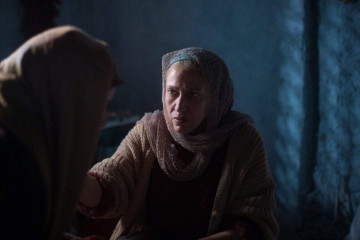

The 68th BFI London Film Festival (LFF) returns this October with a slew of films from home and abroad to whet the appetite of cinephiles in the capital and across the UK.
Taking place over twelve days, from October 9 to 20, the festival features 253 films, shorts, series, and immersive works. This year's lineup boasts an impressive number of Middle Eastern and North African films and filmmakers.
Having covered the LFF for nearly a decade, I've learned that many of the MENA films in its annual program take a long time to secure worldwide distribution, especially in the UK, if they get it at all.
So if you're in London or at one of the various cities hosting satellite screenings, be sure to grab tickets to one (or all) of these MENA films.
A tale of two Aïchas
There are two Tunisian films with protagonists named Aïcha.
Mehdi M. Barsaoui follows up his acclaimed feature debut A Son with Aïcha, a female-focused drama about a young woman trying to escape her past but getting caught up in present-day turmoil.
Aya, in her late twenties, feels suffocated by her life. She lives at home with her parents in southern Tunisia and works at a local hotel. After surviving a car crash, she flees to Tunis under a new identity. However, her subterfuge is threatened when she becomes the sole witness to a police blunder.
Meanwhile, the Aïcha in Meryam Joobeur's ambiguous drama, Who Do I Belong To, contends with the return of her son, Mehdi, from fighting in Syria. However, he is not alone; Mehdi returns to his mother and father's North Tunisian home with a pregnant wife, causing maternal strife and communal friction in their village.
An Iranian dispatch
To be an Iranian filmmaker often comes with the threat of having your life and freedom taken away if you dare to speak truth to power through your art.
No one knows this better than Mohammad Rasoulof, the prolific independent filmmaker forced to live in exile due to being targeted by the Iranian regime over his films and activism. I was introduced to him through his excellent 2020 anthology feature There Is No Evil, and now he returns to London with The Seed of a Sacred Fig.
This tense political thriller, set in the domestic space, follows Iman (Missagh Zareh), an investigating judge in the Revolutionary Court in Tehran, at a time when national protests against the government have intensified.
When his gun disappears at home, he suspects his wife, Najmeh, and daughters, Rezvan and Sana, are involved, enforcing drastic rules that make tensions even more volatile.
Offering perhaps a more uplifting look at life under oppression, Farahnaz Sharifi's essay-style feature debut, My Stolen Planet, explores her history as well as the lives of others through 8mm recordings.
Also making his feature debut is homegrown talent Sasha Nathwani with his coming-of-age film Last Swim. Co-written with Helen Simmons, the drama follows Ziba (Deba Hekmat), a British-Iranian teen, as she runs around London with her friends on A-Level results day, contending with home secrets and tough choices that will change the course of her future.
Palestine on screen
During the 2023 festival, the October 7th attack occurred, a massacre that triggered Israel's war on Gaza and the Occupied Palestinian Territory.
The Israeli regime's international law-violating conduct continues to devastate Palestinians, making it crucial to keep Palestinian stories alive and voices loud.
LFF is doing just that by programming a range of Palestinian films, including Kamal Aljafari's A Fidai Film, Noor Abed's A Night We Held Between, and Mahdi Fleifel's To A Land Unknown.
However, I am most excited to see Laila Abbas's feature debut, Thank You for Banking With Us, which is having its world premiere at LFF. This drama, similar to Amjad Al Rasheed's Inshallah A Boy, grapples with gender discrimination in Sharia law.
Abbas writes and directs this familial escapade centered on two sisters, Maryam (Clara Khoury) and Noura (Yasmine Al Massri), who must put their differences aside to ensure their fair share of a large inheritance left by their father in a bank — before their brother discovers his death and claims half for himself due to being the male sibling.
The film looks set to be a frustrating yet empowering display of Arab womanhood in the face of archaic gender rules, making it a must-see.
Check out the full BFI London Film Festival lineup here.
Hanna Flint is a film and TV critic, writer and author of Strong Female Character with bylines at Empire, Time Out, Elle, Town & Country, the Guardian, BBC Culture and IGN
Follow her here: @HannaFlint



 Follow the Middle East's top stories in English at The New Arab on Google News
Follow the Middle East's top stories in English at The New Arab on Google News


